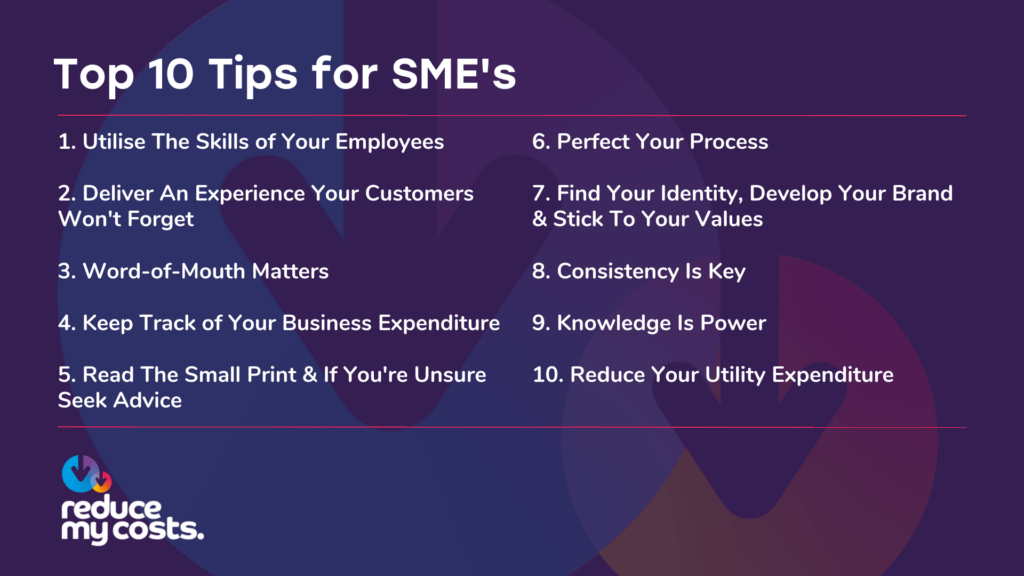
It's National Small Business Week!
At Reduce My Costs our mission has always been to help small businesses thrive and find ways to reduce their business expenditure. Out of the 5.6 million businesses in the private sector, 5.5 million of them are small businesses. We believe their economic contribution deserves acknowledgement. In recognition of Small Business Week (1-7 May), we have put together our top tips for running a small business.
Small Business Week takes place on the first week of May, with the aim to raise awareness and show appreciation for the substantial impact small businesses have on the UK economy, making up 99.9% of the business population in the UK.
We understand setting up and running a small business can be a strenuous task and not everything goes to plan at times. That’s why our directors have put together their top tips to help you avoid common mistakes made by small businesses. From employee satisfaction, to money management, our top tips will help propel your business into success.

1. Utilise The Skills of Your Employees
Take care of your staff and use their talents and skills to the best of their ability, delegating whenever possible. Employees are an integral part for most businesses across the UK, with your employees being incredibly talented in their own unique way. Delegating workload gives you as a business owner the time to focus on higher-level tasks whilst giving your employees the ability to learn and develop new skills, you might even find that your employees can do the task better than you could anyway!
2. Deliver An Experience Your Customers Won't Forget
Try your best to deliver an experience your customers won’t forget, whether that is through sales service or via customer support. The customers experience has a knock-on effect. If you get it right first time, this will boost the likelihood of the customer staying loyal to you and your business as well as recommending you.
3. Word-of-Mouth Matters
When talking to customers and peers always ask the question “do you know anyone else who could benefit from this service/product?”. Encouraging word of mouth costs nothing and can be very effective, especially for small businesses. Think about it, you’re more likely to trust a friends recommendation over a google search result.
4. Keep Track of Your Business Expenditure
Tracking your business expenditure is key to making a profit; make sure you are keeping on top of all your incoming and outgoing payments, so you have a good idea of your cashflow. This can allow you to make informed business decisions, knowing you have enough money set aside to take those next steps. If you’re struggling with keeping on top of your finances, there are ways to do this externally, such as investing in an accountant.
5. Read The Small Print & If You're Unsure Seek Advice
Running a business means reading a lot of legal documents, which can be a timely and complicated task; however, skipping this step can have a detrimental long-term impact. By reading all contracts and terms and conditions you are aware of what you’re agreeing to and can make informed decisions without any surprises later down the line. If you’re unsure on anything, seek advice from someone who is knowledgeable in the subject – you won’t regret it.
6. Perfect Your Processes
Operational procedures can be a trial-and-error practice; find the best processes for your business and the teams within. This will allow you and your employees to perform more efficiently and avoid any unforeseen issues.
7. Find Your Identity, Develop Your Brand & Stick To Your Values
Your business doesn’t just provide a service or product, it tells a story. By developing your brand, customers can identify you visually and emotionally. The importance of this is often overlooked, but with the right branding, and a strong digital presence your business can be elevated to a new level. People are inclined to shop with a brand that aligns with their own values, therefore, establishing and promoting your values will set you apart from your competitors.
8. Consistency Is Key
By being consistent in all aspects of your business, you can ensure each customer receives the same high-quality experience and your employees remain happy and productive at work. Understanding your customer lifecycle can help you identify areas of inconsistency, both with the customer experience and internal procedures. Once you have recognised these you can make changes to ensure consistency.
9. Knowledge Is Power
Every day is a day to learn; from keeping on top of current trends, to teaching yourself new skills, you can develop your abilities and knowledge within your specialist field. This will allow you to keep ahead of the curve and support your customers and employees with any of their needs.
10. Reduce Your Utility Expenditure
Now you’ve got on top of your business finances, why not try, and find ways to reduce your outgoings. You might be paying more than you need for your utility costs; such as, energy, water, insurance and more. At Reduce My Costs we can do the hard work for you and see where savings could be made across your business. Get in touch with us today and we can start saving you money and helping your small business thrive.














